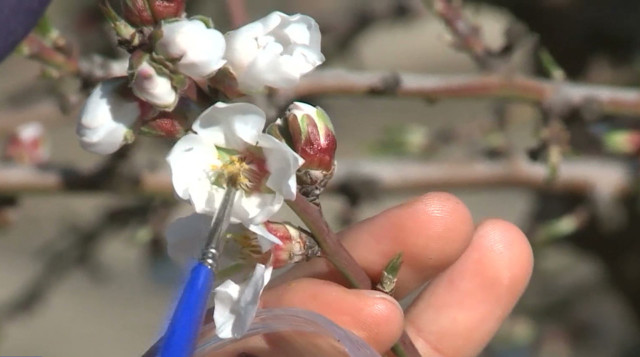Each year, Honeybees add at least $15 billion dollars in value to the U.S. agriculture economy through crop pollination.
But for the past decade, the insects have come under serious pressure with huge populations dying off in what’s come to be known as colony collapse disorder.
Although there’s still disagreement over the cause, CGTN’s Mark Niu visited one startup that believes it has a solution.
At San Francisco’s IndieBio accelerator lab, CEO Matias Viel of the startup Beeflow works with a formula that he can’t reveal. But he believes their two concoctions could have groundbreaking implications.
In this almond field in California’s Central Valley, the all-natural ingredient formulas are being tested on bees. One of the formulas contains an organic compound specially designed to boost the bee’s immune system.
“In 2016 USDA has recorded that 44 percent of the bee population has been lost because of low temperatures and because bees were exposed to pesticides that decrease their immune system,” Matias Viel, the co-founder & CEO of Beeflow said.
“The immune system of the bees is affecting their behavior while pollinating crops. We started feeding bees with this technology to develop stronger bees that can work under low temperatures.”
Beeflow co-founder Agustin Saez, who has a PhD in crop pollination, is researching precisely how much pollination is needed for this farm. He’s also helped develop Beeflow’s second formula, which conditions the bees to stay on course.
“You can apply these molecules so the bees are going to learn which specific crop do you want to pollinate,” said Saez. “That works well when you have competitive flora and you want to have the bees working on the crop you want to pollinate.”
Beeflow has already conducted tests in Argentina, where it says it helped farmers increase yields by 20 to 90-percent. Compared to regular blueberries, theirs grew 13-percent larger. Their Kiwi fruit grew 30 percent larger.
“A small apple has less seeds in comparison with a bigger apple,” said Viel. “Because before the apple there was a flower that received X amount of pollen being transferred by bees. ”The size of the fruit has different prices in the market as well.”
The almonds fields at Simba Farms are Beeflow’s first U.S. test.
“The cost of hives today is somewhere in the range between $185 to 225,” said John Baker, Partner of Simba Farms. “This year we’re at about 750 hives. If we could somehow quantify the number of bees that we actually truly need.”
The impact on the almond crop here will be determined in a few months time – one more step in Beeflow’s scientific journey to prove bees can do much more than ever imagined.
Reed Johnson discusses reasons behind the drastic decline of global bee population
CGTN’s Rachelle Akuffo spoke to Reed Johnson from the Ohio Agricultural Research and Development Center about bee decline and impact on global food chain.
 CGTN America
CGTN America

